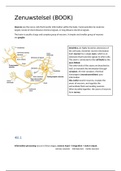Summary
Summary CH48 Nervous system
- Course
- Institution
- Book
Summary of the topic of nervous system from Campbell Biology a Global Approach, 11th edition. This summary includes notes of accompanying MasteringBiology assignments, lectures and any lectures. Summary of the topic of Nerves from Campbell Biology a Global Approach, 11th edition. This summary incl...
[Show more]




